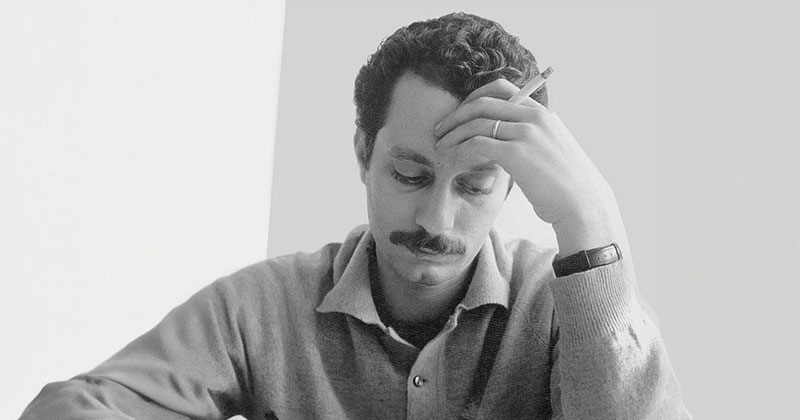A brief remembrance of Ghassan Kanafani.
The Palestinian cause is not a cause for Palestinians only, but a cause for every revolutionary, wherever he is, as a cause of the exploited and oppressed masses in our era.
–Ghassan Kanafani
Ghassan Kanafani—the Palestinian resistance writer and revolutionary politician who produced some of the Arab world’s most celebrated works of fiction before he was assassinated in 1972—was born in Akka, Mandatory Palestine, on this day in 1936.
During the 1948 Nakba, Kanafani and his entire family, like so many others, were expelled from their home and forced into exile. After briefly taking refuge in Lebanon, the Kanafanis settled in Damascus, where Ghassan would go on to complete his secondary education and receive a UNRWA teaching certificate. He then worked as a teacher in a refugee camp, and wrote his first short stories in an effort to help his young Palestinian students contextualize their situation.
In 1952, Kanafani began studying Arabic Literature at the University of Damascus, but was later expelled for his political affiliations with the pan-Arab nationalist organization Movement of Arab Nationalists (MAN), to which he was recruited by the Marxist Palestinian politician and physician George Habash.
In 1961, he married Anni Høver, a Danish educator and children’s rights activist with whom he had two children, Fayez and Laila. Throughout the 1960s, alongside his fiction writing, Kanafani edited and wrote for various MAN-affiliated publications, sometimes pseudonymously, before moving away from pan-Arab nationalism and towards revolutionary Palestinian struggle.
His breakout work of fiction, the short story collection Men in the Sun, was published in 1962 to widespread critical acclaim. Its titular novella follows three displaced Palestinian men who travel from the refugee camps in Iraq to Kuwait where they hope to find work as laborers in the oil boom. Exploring themes of sexuality, masculinity, rootlessness, exile, and loss, “Men in the Sun” has been one of the most admired and oft-quoted works of modern Arabic fiction for over 60 years now.
Men in the Sun was followed by the novellas All That’s Left to You (a more formally experimental work in which Kanafani “paints an intimate portrait of a brother and sister in Gaza and the brother’s dangerous escape through the desert”) in 1966, and Returning to Haifa (a harrowing political parable in which a Palestinian couple try to come to terms with the fact that their five-month-old child, a son they were forced to leave behind in their home in Haifa in 1948, has been raised as an Israeli Jew) in 1969.
In 1967, in the aftermath of the Six-Day War, Kanafani joined the Popular Front for the Liberation of Palestine (PFLP) and became its spokesman, using his political art to raise awareness and communicate the humanity of the Palestinian struggle. The author once said of his dual identity:
My political position springs from my being a novelist. In so far as I am concerned, politics and the novel are an indivisible case and I can categorically state that I became politically committed because I am a novelist, not the opposite.
On May 30, 1972, three members of the Japanese Red Army, working in collaboration with the PFLP, opened fire on passengers at Lod Airport, killing 26 people. Kanafani did not take part in violence himself but was a supporter of attacks against Israel and had publicly rejected the idea of negotiations with the Israeli government.
When asked in an interview why Palestinians don’t “just talk” to the Israelis, Kanafani responded “talk to whom”? He continued: “That’s the kind of conversation between the sword and the neck . . . To us, to liberate our country, to have dignity, to have respect, to have our mere human rights, is something as essential as life itself.”
On July 8, 1972, a 36-year-old Kanafani and his 17-year-old niece Lamees Najim, to whom he had dedicated his first book, were killed by a car bomb in Beirut, where Kanafani had recently settled with his young family. Mossad later claimed responsibility for the assassination.
Kanafani’s murder sent shock waves through the Arab world, but his legacy (he left behind nearly twenty volumes of short stories, novels, and essays) had, by then, long been secured. As this article, published in Middle East Eye on the 50th anniversary of his death, details:
Kanafani left behind a legacy as one of Palestine and the Arab world’s greatest writers, with schools and cultural organisations named after him across the region.
In Israel he is remembered as a terrorist, but Palestinians celebrate him for his literary skill and his tender portrayal of their struggle. His stories laid the ground work for other Palestinian authors who helped develop his concept of “resistance literature.”
In its obituary, Lebanon’s The Daily Star newspaper called Kanafani a “commando who never fired a gun, whose weapon was a ballpoint pen, and his arena, newspaper pages.”
One of Kanafani’s most famous works, the 1956 short story “Letter from Gaza” (composed when the author was barely twenty years old), is written in the voice of a young Palestinian man who has returned to his destroyed neighborhood in Gaza. In a letter to a friend who is eagerly awaiting his arrival in Sacramento, the man recounts a trip to see his badly wounded niece, and explains his decision to “remain among the ugly debris” of his brutalized home place rather than escape to “the land where there is greenery, water and lovely faces.” Reading it today, after all we have witnessed these past six months, is almost unbearable.
In honor of Kanafani’s birthday, here is the late John Berger reading “Letter from Gaza” as part of his address to the inaugural Palestine Festival of Literature in 2008.





